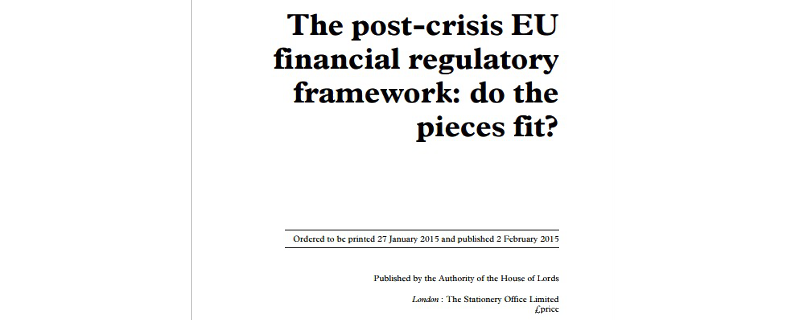
A new report by the House of Lords finds that the UK would have adopted "the vast bulk" of EU financial regulation, even if we had not been a member.
By Will Cousins
We all know how vital the financial services industry is to this country. It accounts for 10% of GDP, 12% of the tax take, and supports 1.1 million jobs, most of them outside London. By any measure, the City is the financial services capital of Europe, accounting for 75% of European capital markets and investment bank revenues, 80% of hedge fund management and 70% of private equity management. Moreover, British membership of the EU is an important reason for the sector’s success- without a financial passport to operate in the Single Market, banks wishing to do so would have to move some of their operations to the continent.
But there are concerns about regulation. There is a perception among some that EU regulation has been heavy-handed, and they have a point. The bonus cap is a bad policy, one which will not do UK financial services much good. But these legitimate concerns have been grasped by Eurosceptic groups, who pretend that the City is strangled by vast quantities of Brussels red tape. A report by Business for Britain, claiming that the UK would not have introduced 50% of financial regulation, is an example of this.
That is why a new House of Lords report, “The post-crisis EU financial regulatory framework: do the pieces fit?“, deserves reading. Produced by the EU select committee, it was noticed for its view that Britain’s influence is on the wane in Brussels, in part due to Eurosceptic policies and the possibility that we might leave. But it had much more to say than that.
The report is unequivocal that: “It is likely that the UK would have implemented the vast bulk of the financial sector regulatory framework had it acted unilaterally, not least because it was closely engaged in the development of the international standards from which much EU legislation derives.” The only regulations it concedes that would not be implemented by the UK acting alone are those related to remuneration.
The report also addresses the “gold-plating” of EU directives by the UK government. It is true that, given the size and scale of our financial sector, we might need more sophisticated regulation than some small EU states. But the committee finds the extent of gold-plating to be excessive. It rightly reminds us that “the more regulatory inconsistency that is created, the greater the threat of regulatory arbitrage and of competitiveness risks.”
This matters because it shows that the UK government acting on its own has added to the regulatory burden. As former chair of the European Parliament committee on economic and monetary affairs Sharon Bowles put it in her evidence to the committee, it is “rubbish” to believe that “in the absence of EU regulation there would be no regulation” in the UK. It is equally absurd to pretend to own a crystal ball that can prove that financial services regulation would be particularly different were Britain not a member of the European Union.
Read the full report here: The post-crisis EU financial regulatory framework: do the pieces fit?
